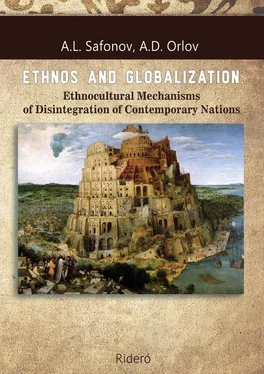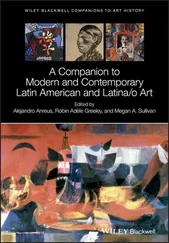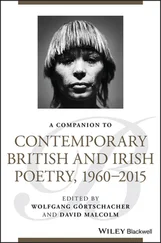But the dominant aspect of globalization is deep social change, predicated on the crisis of state institutions and religious and ethical bases of leading global civilizations defining history of the last two thousand years. 176 176 Orlov, A. D., Safonov, A. L. Crisis of the nation state: globalization and legacy of the “axial age” // Russian scientific conference “Moral state as imperative of state evolution”. Russian Academy of Sciences Humanities Department. RAS Institute of State and Legislation. Institute of Scientific Knowledge on Humanities of the RAS, Centre of Problem Analysis and State Management Projects. M., 2011. – p. 25.
The antagonism of peripheral and dominant social communities and groups will engender essentially different, alternative values, models and forms of social life. Having swallowed the whole world, the global empire engenders and nurtures within its borders new processes of the formation of structures.
To sum up, globalization is a process of the synthesis of the systemic whole, but similarly a deeply fragmented and antagonistic global social community that cannot be reduced to the mechanical sum of local communities and local economies.
The synthesis of civilizations and states forced by globalization into a single, albeit heterogeneous and contradictory supra-system does not signify the expected transformation into a global state. Actors in the global development become participants in an increasingly multi-faceted and multidimensional conflict, wherein a global war unites conflicting parties into a single system much faster than the global world.
While the difference between peace and war may be defined as a major reduction in the intensity of the interaction of agents, as peaceful coexistence does not pose issues of life and death for the sides, the opposite is also true: increasing intensity of interaction (globalization being the intensification of the interconnectedness of the global system) inevitably grows into conflict.
Thus, the erosion of spatial barriers and borders has led not to the dismissal but to the aggravation of contradictions between agents, including intercivilizational and social ones, to the transition of old geopolitical conflicts into new non-spatial dimensions – legal, informational, cultural, demographical – whose importance is steadily increasing and will grow in the foreseeable future.
As a result, the situation in which spatial barriers are falling during the aggravation of contradictions and competition often leads not to the dissolution of social groups involved in the global process but to their additional consolidation and radicalization, the strengthening of non-spatial mechanisms of separation and the formation of identities, initially ideological and ethnocultural. In brief, it leads to sharp invigoration of sociogenetic and convergent processes. 177 177 Safonov, A. L., Orlov, A. D. Globalization as divergence: crisis of the nation and “renaissance” of ethnos // Vestnik Buryatskogo Universiteta. Vyp. 6 (Filosofiya, Sotsiologiya, Politologiya, Kul’turologiya). Ulan-Ude, 2011. – p. 17—23.
Persisting under the conditions of globalization, local social systems can no longer be adequately described or adequately ruled outside the systemic context, be it a global cooperation or a global conflict.
Collapsing in on itself in the space, the contemporary ecumene takes on previously unseen complexity through new, non-spatial changes. Geopolitical agents continue to lose their spatial geographic localization and take on a qualitatively new topology which cannot be accurately described using the categories of pre-globalization, when space was a universal regulator and a limit-setter for external impacts, a leading system-building and structuring factor of ethno- and nation-building.
Due to a major increase in social mobility and transparency, national, corporate and ethnic elites are obtaining degrees of freedom that are more significant than in the time of the nation states, to the extent that it is possible for them to be completely separate from the national soil and state institutions. Non-state social institutions and structures, such as corporations, ethnic diasporas and social networks, which become full-fledged actors in global and local politics, are becoming the new elite generators.
While previously the world consisted of relatively closed-off social systems, at present, local systems maintain and strengthen the regional and civilizational specific character, including confessional and ethnic particularities.
The social mechanism of the influence of globalization on the social sphere consists of the establishment not so much of global markets of goods and finance but of new mechanisms of the reproduction of the elites as influential social groups standing behind the actors of global politics and forming it with their interests.
Characteristically, every large actor in contemporary global politics has a corresponding mechanism of social mobility behind it, a generator of skilled workers, or social elevators, alternative to traditional mechanisms of vertical mobility, connected to the institutions of the nation state.
It should be noted that the resource of new, non-state actors derives from the policy of utilization, well understood by the alternative non-state elites: the policy of the interception of the resource base of states and nation states is often defined as privatization of the welfare state. Not only are top managers of large transnational corporations and international financial structures part of new non-state elites, but so too is an influential, although relatively narrow, group of the so-called international bureaucracy, managers at the IMF, the UN, the European Union and other influential international organizations.
A specific type of new non-state elite is being formed within the borders of global and regional ethnic communities, communes, diasporas and ethnocriminal groups, whose political influence in the world has grown significantly along with the growth of global migration, the degradation of the institutions of the contemporary state, the erosion of national identity and its partial replacement by the confessional and ethnic.
The omnipresent multiculturalization and ethnicization of classic civil nations is developing in the United States, where multiple ethnic communities, increasingly oriented towards their countries of origin, are becoming increasingly influential and transforming the traditional party system of the United States into a system of ethnic lobbies.
Non-state elites, comprising a social basis of non-state actors of global politics, are not separated by the insurmountable barriers of old elites born out of the nation state. On the contrary, they all intersect and fit together to create a single stratum, integrated by social connections and mechanisms of social mobility.
Non-state local elites, interested in the resource flows of nation states, rather efficiently reach their goals through the mechanism of the intersection of elites, gradually transforming the state, according to Adam Smith 178 178 Smith, Adam. The Wealth of Nations: A Translation into Modern English, Industrial Systems Research, 2015
, from political sovereign to night-watchman. At the same time, non-state social actors do not form global elites separated from historical soil, non-mythicized new nomads devoid of cultural identity, but rather globalized strata of national and local elites. These elites play out a liberal scenario of the privatization of national income, nationalization of expenditures, mostly on national and local levels, but also on a global level.
Sketching out the social structure of a new global world, Richard Haass, the chairman of the Council of Foreign Relations, acknowledges the appearance in the social arena of new types of influential political and social actor, comparable in their abilities to the classic territorial state but having at the same time their own agency and interests independent from the state and its institutions. 179 179 Haass, Richard. The age of nonpolarity: what will follow US dominance? // Foreign Affairs. 2008. May – June. – P. 44—56.
The transition of global politics into non-state and non-spatial dimensions, not linked to geopolitical poles and power hubs, is, according to Haass, “nonpolarity”. The situation of nonpolarity provides an organic base for the concept of soft power as political dominance based on the control and exploration of new spheres of non-force conflict in close cooperation with new types of influential social actor, many of which – for example, non-state organizations and private armies – are purposely created as foreign policy tools.
Читать дальше












